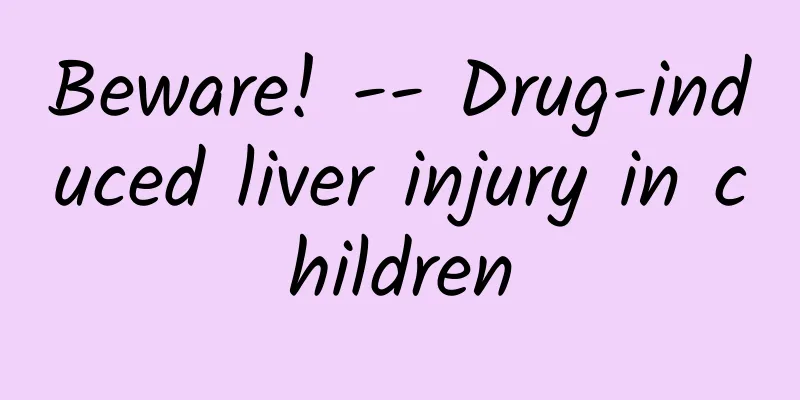Beware! -- Drug-induced liver injury in children

|
Drug-induced liver injury (DILI) is one of the most common and serious adverse drug reactions (ADRs). Severe cases can lead to acute liver failure (ALF) or even death. Due to factors such as immature liver function in children, lack of safety data related to children for most drugs, and poor awareness of rational drug use among parents, the incidence of DILI in children has been on the rise in recent years. Therefore, DILI in children is an issue that cannot be ignored. Drug-induced liver injury can be divided into two types. One is related to the dosage of the medication, that is, this type of drug damages the liver. The more you take it and the longer you take it, the more likely it is to cause liver damage. The other is called specific drug liver injury. This type of liver injury has nothing to do with the dosage of the medication you take, but is related to your personal constitution. Therefore, drug-induced liver injury may occur when the medication is overdosed, or it may occur under normal medication conditions. 1. Which drugs are likely to cause liver damage in children? Studies in my country have shown that the top three types of drugs that cause drug-induced liver injury in children are: antibiotics, traditional Chinese medicine, and antipyretics and analgesics. Other related drugs include anti-epileptic drugs, anti-tuberculosis drugs, and anti-tumor drugs. 2. In addition to medicine, the living environment of children should not be ignored! Most children have poor safety awareness and are very curious. Chemical products at home, such as detergents and pesticides, should be kept away from children to avoid accidental ingestion. For infants and young children, the oral-hand route is also a key link in the ingestion of poisons. For example, if a child touches furniture treated with pesticides and then puts the Putting your hands in your mouth and ingesting a certain dose may also cause drug-induced liver damage. 3. What should I do if I suffer from drug-induced liver injury? If drug-induced liver injury occurs, it is necessary to discontinue and replace medications under the guidance of a professional doctor, and perform liver protection treatment according to the severity and type of liver injury. In some cases where severe drug-induced liver injury rapidly develops into liver failure, liver transplantation surgery is required in a timely manner. Depending on the different types of liver damage, liver protection drugs can be selected from magnesium isoglycyrrhizinate, bicyclol, glycyrrhizic acid preparations, silymarin, ursodeoxycholic acid, glucocorticoids and other drugs. Under the doctor's advice, 1-2 drugs with different mechanisms of action should be selected for liver protection treatment. 4. How to prevent drug-induced liver injury in children? 1. See a doctor when you are sick and follow the doctor's advice when taking medicine. Do not blindly buy medicines and health products for preventive health care! Medication needs to be taken under the guidance of a doctor or pharmacist. Do not blindly increase or decrease the dosage or add other medicines! Do not listen to folk prescriptions or special medicines with unknown ingredients! 2. If the child does have a chronic disease that requires long-term medication, liver and kidney function should be monitored regularly. In many cases, liver and kidney damage does not have any symptoms, so regular check-ups, early detection, and early intervention should be carried out. 3. We should pay attention to creating a safe living environment, keep toxic items such as medicines and chemicals at home away from children so that they cannot see or touch them, and provide safety education for children above preschool age to avoid tragedies such as accidental ingestion. 4. It is recommended that patients with chronic diseases who receive long-term drug treatment, patients with severe adverse drug reactions or family histories can undergo drug gene testing to achieve "individualized" treatment and reduce the chance of adverse reactions. I hope parents and friends will raise awareness of rational use of medicines, increase vigilance, and use medicines safely to protect the healthy growth of our children! |
Recommend
Can pregnant women have foot bath massage?
Pregnant women should pay attention to protecting...
What is going on?
Irregular menstruation is a common gynecological ...
Which day of menstruation is the best for weight loss? You should take advantage of these 3 periods
During menstruation, the body's metabolism wi...
Why do female nipples become larger?
Enlarged female nipples have become a disease tha...
Is sea buckthorn juice delicious? How to drink sea buckthorn juice
Seabuckthorn juice is a drink made with seabuckth...
I have been taking ibuprofen for 5 years for dysmenorrhea
Dysmenorrhea refers to lower abdominal pain and h...
How long after a vaginal ultrasound can I have sex?
If a woman has symptoms in her vagina or uterus, ...
Why do babies have good skin? How do adults take care of their skin?
In our lives, sometimes in some shopping malls yo...
Sleeping at this time every day can really reduce the risk of cardiovascular disease! Try it now!
Some people say that going to bed early and getti...
Why should we eat whole grains? Here are 10 healthy reasons for you!
Eating more whole grains and coarse grains has be...
What should I do if my genitals are itchy and have tofu residue?
The vulva is a female reproductive organ located ...
What is right breast pain?
What is right breast pain? For women, if it is bi...
What to do if bleeding lasts long after medical abortion
Is pregnancy a happy thing or a worrying thing? I...
Do I need to walk around after taking the medicine?
Medical abortion is one of the most frequently us...









